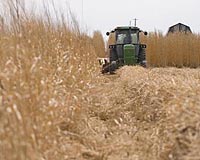 |
Broomfield CO (SPX) Aug 19, 2010 Range Fuels, Inc. has announced that it has produced cellulosic methanol from the initial phase of its first commercial cellulosic biofuels plant near Soperton, Georgia using non-food biomass. The first phase of the Soperton Plant operations employs Range Fuels' innovative, two-step thermo-chemical process, which uses heat, pressure, and steam to convert non-food biomass, such as woody biomass and grasses into a synthesis gas composed of hydrogen and carbon monoxide. The syngas is then passed over a proprietary catalyst to produce mixed alcohols that are separated and processed to yield a variety of low-carbon biofuels, including cellulosic ethanol and methanol. The cellulosic methanol produced from Phase 1 will be used to produce biodiesel, ultimately displacing diesel oil in transportation fuel markets. It may also be used to displace diesel in heating applications, used as a fuel additive in gasoline-powered motor vehicles, or used to power fuel cells. Range Fuels plans to begin production of cellulosic ethanol from the plant in the third quarter this year. The cellulosic ethanol will meet ASTM standards for fuel-grade ethanol and will be used to displace gasoline in local and regional transportation fuel markets. "We are ecstatic to be producing cellulosic methanol from our Soperton Plant, and are on track to begin production of cellulosic ethanol in the third quarter of this year," said David Aldous, Range Fuels' President and CEO. "This milestone is a giant step in overcoming the technological and financing challenges facing the commercialization of cellulosic biofuels and positions us extremely well to expand production of cellulosic biofuels. Additionally, with the first U.S. commercial production of cellulosic biofuels from non-food biomass, Range Fuels has taken a giant step in delivering on its vision of offering solutions to the pressing global challenges of energy independence, the environment, and the economy." The Soperton Plant will initially use woody biomass from nearby timber operations, but plans to experiment with other types of renewable biomass as feedstock for the conversion process, including herbaceous feedstocks like miscanthus and switchgrass. Range Fuels plans to expand the capacity of the plant to 60 million gallons of cellulosic biofuels annually with construction to begin next summer. The Soperton Plant is permitted to produce 100 million gallons of ethanol and methanol each year.
Share This Article With Planet Earth
Related Links Range Fuels Bio Fuel Technology and Application News
 Wide Range Of Plants Offer Cellulosic Biofuel Potential, Ecological Diversity
Wide Range Of Plants Offer Cellulosic Biofuel Potential, Ecological DiversityBerkeley CA (SPX) Aug 17, 2010 When it comes to selecting the right plant source for future cellulosic biofuel production, the solution won't be one-size-fits-all, and it certainly doesn't have to involve food and feed crops. In a "Perspective" article in the Journal Science, researchers from the Energy Biosciences Institute suggest that a diversity of plant species, adaptable to the climate and soil conditions of speci ... read more |
|
| The content herein, unless otherwise known to be public domain, are Copyright 1995-2010 - SpaceDaily. AFP and UPI Wire Stories are copyright Agence France-Presse and United Press International. ESA Portal Reports are copyright European Space Agency. All NASA sourced material is public domain. Additional copyrights may apply in whole or part to other bona fide parties. Advertising does not imply endorsement,agreement or approval of any opinions, statements or information provided by SpaceDaily on any Web page published or hosted by SpaceDaily. Privacy Statement |